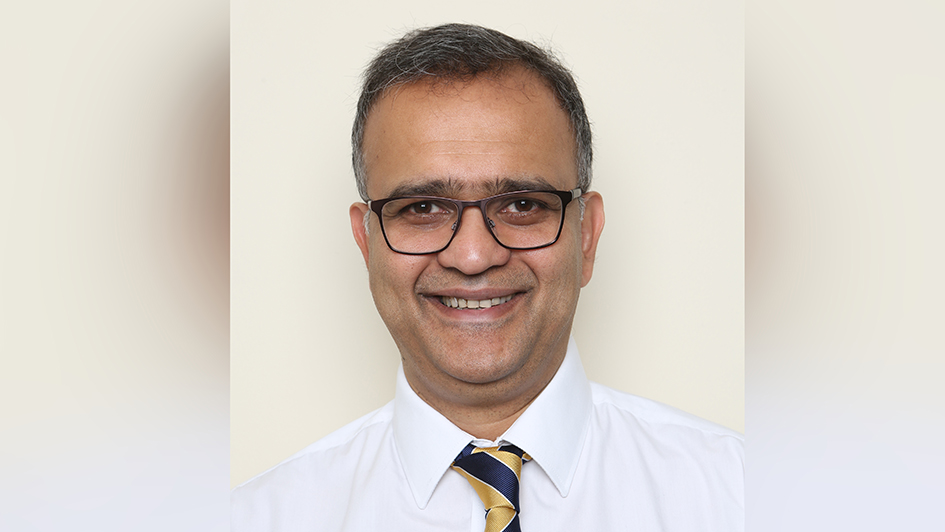
“The ICR has been making discoveries in understanding and treating cancer for over a century, and Udai has been a key part of that work for nearly twenty years,” said Professor Johann de Bono, Director of the Drug Development Unit at the ICR and The Royal Marsden, as he introduced the newly-promoted Professor Udai Banerji. “He is a world leader in cancer drug development.”
It’s clear from Professor Banerji’s achievements that this truly is the case.
Since joining the ICR as a clinical fellow in 2000, Professor Banerji has helped to conduct crucial first-in-human studies of a rich pipeline of drugs discovered by or in collaboration with the ICR, including the Hsp90 inhibitor luminespib (AUY922), the breast cancer drug capivasertib (AZD5363) and the ovarian cancer drug CT900 (formerly known as ONX-0801).
And as Deputy Director of the Drug Development Unit, he helps to oversee one of the largest phase I trial centres in the world.
Targeted therapies at the ICR
In his talk, ‘Pharmacological tales of personalising cell death, overcoming resistance and understanding evolution of cancer’, Professor Banerji described some of this extensive experience of developing ever more targeted treatments – as well as his hopes for the future of cancer drug development.
He explained how targeted therapies work in one of two ways – either by affecting only cancer cells, or by delivering treatments directly to the cancer cells.
The first type includes Hsp90 inhibitors – which target a protein whose structure and function we determined at the ICR. In the late 1990s Professor Paul Workman, our current Chief Executive, recognised the potential of Hsp90 in his role as Director of the Cancer Research UK Cancer Therapeutics Unit, and later worked with partners to discover the Hsp90 inhibiting drug luminespib.
AUY922 was then licensed in 2004 to Novartis, and Professor Banerji led the drug’s phase I trial at the Drug Development Unit.
The other type includes drugs like CT900, which mimics the action of folic acid to enter cells.
The drug is the first in a brand new class of drugs discovered at the ICR, and showed very promising results in an early clinical trial – again, led by Professor Banerji – in which seven of 10 women whose tumours had the particular molecular target for the drug responded to treatment.
The Institute of Cancer Research, London, works in partnership with funders to deliver a number of major research centres and collaborations focused on key strategic priorities.
Read more
Creative ways to overcome drug resistance
But Professor Banerji is not content to rest on his, or the ICR’s, laurels.
“We can give targeted treatments to patients, but at some point they develop resistance – we need to overcome this.”
One way to do this is to predict what cancer cells will do next, and get ahead of them. Working with Professor Bissan Al-Lazikani, an expert in computational tools that process large amounts of data for drug discovery research, he has been exposing lung cancer cell lines and patient derived cells to current treatments, to collect data on how the cells react and ‘re-wire’ themselves to become resistant to treatment.
Armed with that information, they are able to predict how cancer cells will respond to treatment – which, in future, could allow doctors to design combination therapy regimens.
Professor Banerji also spoke about his collaboration with Dr Andrea Sottoriva to develop models of how current treatment influences different populations of resistant cancer cells.
Taking this one step further, Professor Banerji is hopeful that it may one day be possible to ‘herd’ cancer’s evolution, instead of allowing it to evolve of its own accord, by giving patients drugs between treatments that restrict the number of ways the remaining cells can develop into populations of resistant cells.
Looking to the future
Overall, though, Professor Banerji is optimistic about the future and he believes we can overcome some of the current challenges we face in getting new treatments through to the clinic quickly.
“The future’s bright,” he said. “We’ve got an exciting pipeline of drugs, and as trials improve, we’re able to collect more evidence of effect earlier in the process, which should help patients get access to drugs sooner.”
He’s also still very positive about working at the ICR after nearly 20 years: “The ICR is unique – nowhere else in the world is discovering so many oncology drugs and then trialling them.
“I still get butterflies when we move a new drug into phase I trials, but it’s immensely rewarding to see a drug through the programme for many years and eventually get it into the clinic.”
comments powered by